May 21, 2025 | 10:08 GMT +7
May 21, 2025 | 10:08 GMT +7
Hotline: 0913.378.918
May 21, 2025 | 10:08 GMT +7
Hotline: 0913.378.918
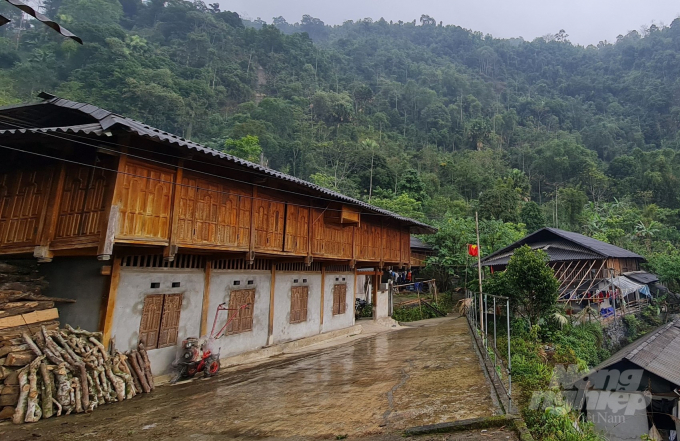
Mr. Minh's house is positioned at the highest point, also the end of Cao Bo commune. Photo: Dao Thanh.
Since Mr. Dang Van Minh got married and moved out, every morning he wakes up early, builds a fire, boils water, brews a pot of strong tea, and enjoys the scent of his hometown's tea, and then gets to work.
For him as well as many elders in Lung Tao, Snow Shan tea scent and flavor have permeated into every fiber of their flesh, giving them strength and vitality to survive the storms, like the roots of a tea tree that penetrate deep into the ground of West Con Linh to nourish the body, giving life a delicious and compelling drink.
Mr. Minh's house is positioned at the highest point, also the end of Cao Bo commune, Vi Xuyen district, Ha Giang. His stilt house is the biggest and most beautiful in Lung Tao village.
Mr. Minh’s 70 years of age is also the amount of time he has been attached to the tea tree. Once he became a grownup his father told him that his life savings were only a tea forest divided equally among the four brothers, each with an area of approximately 4 ha.
When dividing the tea forest with his children, Mr. Minh’s father told him to take care of it, because “the tea helps warm the stomach, just like the Dao Ao Dai people always know how to keep the fire in their house flickering red to warm the stilt house.”
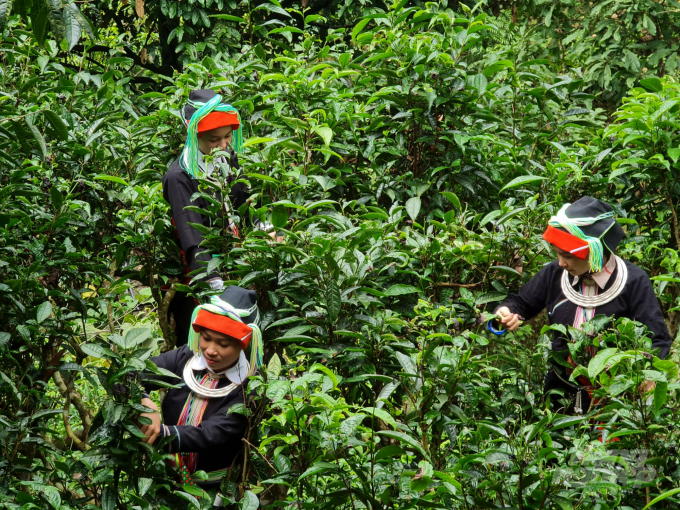
The Snow Shan ancient tea area of Mr. Dang Van Minh's family. Photo: Dao Thanh.
Mr. Minh does not have many children, only Mr. Dang Van Dung with a family of two children and one grandchild at the moment. Mr. Dung’s children also feel greatly attached to the Snow Shan tea tree since their childhood days. They have begun to know how to care for, pick and process tea.
Thanks to Snow Shan tea trees, the economic condition of Mr. Dung and his family has gradually improved. He has bought another 2 ha of forest which has many ancient tea trees in order to earn more money in the harvest season.
Mr. Dung said his two sons, one 18-year-old boy, a full-fledged adult, and the other is 23-year-old boy, married, but he was still worried - worried that they would not do business and sell the ancient tea forest that their grandparents left behind instead. They would no longer have any means to make a living. Mr. Dung would feel so ashamed in front of his ancestors.
Attentively listening to his teachings, the two sons are very enthusiastic about making tea. If their grandfather or father only knew how to simply stir and prepare tea all the time, they now have known how to make high-class specialty teas such as Pu’er tea, Dragon Claws tea, white tea, and bamboo-tube tea. They know how to go online to sell goods and invite customers in Ho Chi Minh City to order hundreds of kilograms of tea for each blossoming crop. The price of tea can reach several million Vietnamese dongs per kilogram.
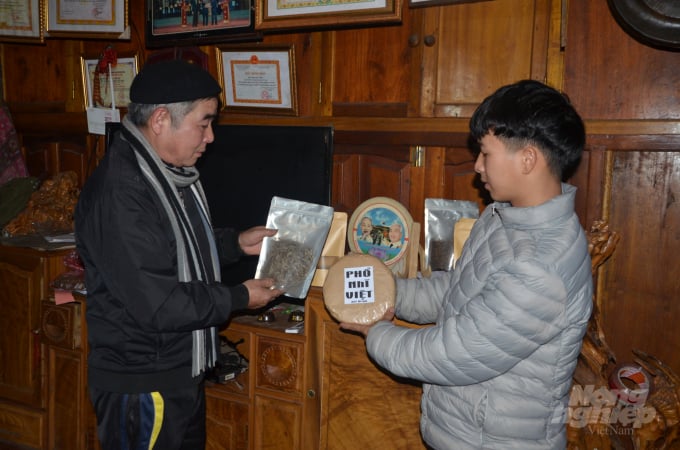
Mr. Minh and his grandson introducing the family's Snow Shan tea product. Photo: Dao Thanh.
The ancient tea forest of Mr. Minh's family currently produces more than 3 tons of fresh tea buds of all kinds every year. Besides, he and his children and grandchildren also buy approximately 2 tons of fresh tea buds from the locals. His family has just built a small workshop to process specialty tea at the end of 2021. The products are beautifully packaged, attracting many foreign customers.
Mr. Dang Van Minh took me to Mr. Dang Van Tai's house, to whom he confided: His biological younger brother, but not brothers "in full".
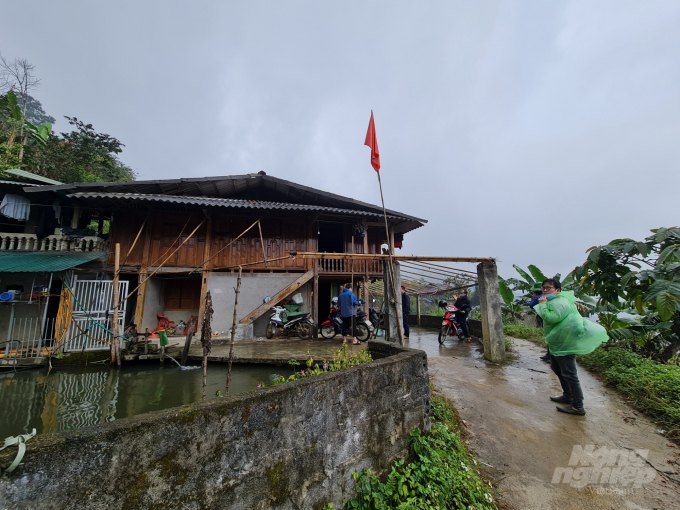
It was raining heavily on our way to the family of Mr. Dang Van Tai - Mr. Minh's younger brother. Photo: Dao Thanh.
In the early 60s of the last century, hunger swept through to the village. The Dao people in Lung Tao bring 3kg of the best and most delicious tea down to the town market to sell, only to exchange 1 kg of weevil rice.
Mr. Minh had five brothers at that time. Not willing to let the whole younglings look at each other and starve to death, his father sold Mr. Tai to his distant cousin for 30 Vietnam dong.
Mr. Dang Van Minh was 10 years old then, and Mr. Dang Van Tai was yet a full 2 years old boy (Mr. Tai's surname Dang was the family name of the adoptive father, not of Mr. Minh's family). Missing and cherishing each other so much, every day Mr. Minh and the other siblings would still come down to visit Mr. Tai.
In fear of affecting the young’s new life, his father reminded Mr. Minh that if he continued to do this, people would take Mr. Tai and his family out of the village. From that day on, he did not dare to go down to his brother's house anymore. “I miss him so much but I only dared to look from a cliff or a grove of trees afar, hid in the forest and then followed the path home,” he said.
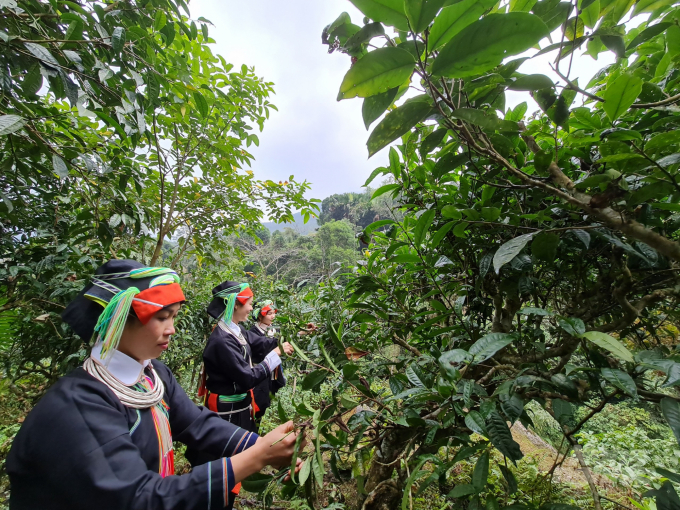
Like Mr. Minh, Snow Shan tea gives Mr. Tai's family and other households in Lung Tao a prosperous life. Photo: Dao Thanh.
Many years later, when Mr. Minh and his brother have all grown up, they can freely call themselves “brother by blood” again. They don't have to sneak out to see each other anymore.
Having received his share of the ancient tea forest from his father, Mr. Minh mentioned the share for Mr. Tai. But Mr. Tai refused, saying his adoptive parents' house also had 5 ha of ancient Snow Shan tea forest, which produced about 500 kg of fresh tea buds each crop.
Mr. Tai believed that this is enough for him and his children to have three meals a day, enough to cover his daily life and for him to build a stilt house as big as his brother's.
In the stilt house flickering with pink fire, two old men talked about the old days. And in just a few more days, spring will come. Tea trees will be older yet another year. Tea sprouts will rise, separate from the stem, and bloom brilliantly. Snow Shan tea will reach its peak season, bringing a prosperous life to Mr. Minh, Mr. Tai, and many others in the village of Lung Tao.
Translated by Samuel Pham

(VAN) In 2024, over 295 million people across 53 countries and territories faced acute hunger—an increase of almost 14 million people compared to 2023, while the number of people facing catastrophic levels of hunger reached a record high.

(VAN) World Environment Day 2025 (June 5) carries the theme 'Beat Plastic Pollution' continuing to emphasize the global urgency of addressing the plastic waste crisis.

(VAN) This was the assessment shared by experts at the workshop titled 'Assessing the Role and Potential of Low-Emission Rice Production Systems in Vietnam,' held on the morning of May 19.

(VAN) Cai Rong Port is the fisheries control center of Quang Ninh, helping to monitor fishing vessels, combat IUU fishing, and remove the EC's 'yellow card'.

(VAN) The German Agricultural Society (DLG) explores the possibility of establishing a mechanization service center in Vietnam’s Mekong Delta to support farmers in accessing and utilizing advanced machinery.

(VAN) On May 16, the Department of Water Resources Management, in collaboration with the Food and Agriculture Organization of the United Nations (FAO), held a signing ceremony for the GEF-8 project document.

(VAN) Food safety, mechanization, vocational training, and market opening are key areas of cooperation expected between the Vietnamese Government and the Federal Republic of Germany.